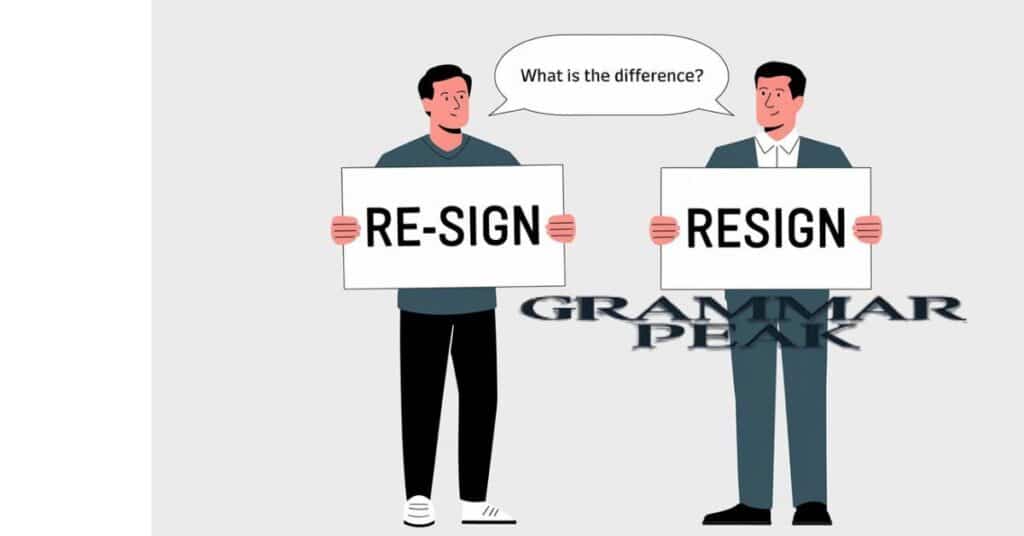Understanding the difference between re-sign and resign is essential for conveying a message with clarity. They sound almost identical, look alike, and so many confuse these two phrases. Yet each of them has starkly contrasting meanings. In this article, we will learn about the proper usage of these two words.
The hyphen with re-sign will be discussed. To reinforce their uses, they will be backed up with synonymous terms and illustrative examples. By the end of the article, you would be so grounded in the concepts behind these words that you would never misuse them in either writing or conversations.
Why is There Confusion?
The confusion between re-sign and resign primarily arises from their similar spelling and pronunciation. At first glance, both words appear identical, with the same letters arranged in the same order. This visual similarity often leads to a mix-up, especially if you’re not familiar with the context in which the words are used.
However, despite their similar appearance, re-sign and resign carry entirely different meanings. Re-sign indicates the action of signing a document or contract again, usually in the context of an extension or renewal. Contrastingly, resign refers to the act of voluntarily leaving a position or job, often formalized through a resignation letter.
The presence or absence of a hyphen further adds to this confusion. While re-sign includes a hyphen, resign does not. This small but significant punctuation mark plays a crucial role in differentiating the two terms. Therefore, understanding the difference between re-sign and resign, and using them correctly, is crucial for clear and effective communication.
You will like Re-sign or Resign? Learn When and How to Use Each Correctly
What Does “Re-sign” Mean?
The term re-sign refers to the act of signing a document again. This is common in situations like contract renewal or employment extension. For example, if an employee’s contract is about to expire, they may re-sign to continue their job.
In this context, re-sign emphasizes the commitment to the same role or agreement. It is essential to use this term correctly to convey the idea of signing again rather than quitting or leaving a position.
What Does “Resign” Mean?
In contrast, resign means to leave a job or position voluntarily. When someone decides to resign, they are formally stepping down from their role. This action often involves submitting a resignation letter to their employer.
The intent behind resigning is to indicate a desire to quit or depart from a job role. Understanding this distinction is vital for effective communication, especially in professional settings.
Explore these Re-sign or Resign? Learn When and How to Use Each Correctly
Why Hyphenate “Re-sign”?
The hyphen in re-sign plays a crucial role in distinguishing it from resign. The hyphenation rule helps clarify that the prefix “re-” modifies the verb “sign.” Without the hyphen, the word could be misread as resign, leading to confusion.
The hyphen signals to the reader that the action involves signing again, not quitting. This small punctuation mark can prevent significant misunderstandings in written communication.
“Re-sign” vs “Resign”: The Differences
Understanding the differences between re-sign and resign is essential for effective communication. The meanings and intents of these words are distinct..
Meaning and Intent
The meaning and intent behind re-sign and resign are fundamentally different. When you
Re-sign, you are reaffirming your commitment to a position or agreement. In contrast, when you
Resign, you are indicating your intention to leave. This distinction is crucial in professional settings, where clarity is vital.
Pronunciation Difference
The pronunciation of re-sign and resign also differs
Re-sign is pronounced with a clear emphasis on the second syllable, while
Resign has a more straightforward pronunciation. This difference can help listeners understand which term is being used in conversation.
Spelling Clues
Spelling clues can also aid in distinguishing between re-sign and resign. The presence of the
The hyphen in re-sign is a clear indicator that it refers to signing again. In contrast, resign lacks
No Hyphen, signaling a different meaning altogether. Paying attention to these spelling clues can help prevent miscommunication.
Sure, here’s a table illustrating the differences between the terms “Re-sign” and “Resign”:
| Re-sign | Resign | |
| Definition | To sign a contract or agreement again, usually to renew or extend its terms. | To voluntarily leave a job or position, usually by formally giving notice. |
| Etymology | Composed of the prefix ‘re-‘, meaning ‘again’, and ‘sign’, from Latin ‘signare’ meaning ‘to mark’. | Derived from Latin ‘resignare’, meaning ‘to unseal, annul, cancel, give back, give up’. |
| Example | The athlete decided to re-sign with his original team. | The director decided to resign from the board due to disagreements. |
| Usage | Commonly used in legal or professional contexts involving the renewal or extension of contracts. | Used across various contexts to denote the act of leaving a job or position voluntarily. |
Synonyms for “Re-sign” and “Resign”
Knowing synonyms for re-sign and resign can enhance your vocabulary and understanding of these terms.
Synonyms for “Re-sign”
- Recommit: To pledge or dedicate oneself again to a cause or activity.
- Extend: To prolong or lengthen the duration of a contract or agreement.
- Continue: To carry on or keep up an agreement or contract.
- Carry On: To keep doing something, often in the context of maintaining a contract or agreement.
- Prolong: To make something, like a contract, last longer.
- Perpetuate: To make a contract or agreement continue indefinitely.
- Keep Up: To continue at the same rate or pace, often used in the context of maintaining a contract.
- Maintain: To keep something, such as a contract, in an existing state or condition.
- Preserve: To maintain a situation or condition, like a contract, without changes.
- Sustain: To keep a contract or agreement going over a period of time.
- Persevere: To persist or continue with a contract or agreement despite difficulties.
- Uphold: To maintain or support a contract or agreement as valid or right.
Synonyms for “Resign”
- Quit: To leave a job or position voluntarily, often permanently.
- Depart: To leave a job or position, typically to go somewhere else or pursue another opportunity.
- Withdraw: To remove oneself from a job or position, often for personal reasons.
- Retire: To stop working after reaching a certain age or after a long period of employment.
- Step Down: To voluntarily leave a position or role, usually to make way for a successor.
- Leave: To go away from a job or position, usually for an extended period or permanently.
- Abdicate: To formally give up a position or responsibility, often used in the context of royalty or high-powered positions.
- Relinquish: To willingly give up a position or responsibility, often after a considered decision.
- Forsake: To abandon or leave a position entirely, usually implying a sense of disloyalty or desertion.
- Exit: To leave a position or role, often in a formal or official capacity.
- Discontinue: To stop performing a role or job, often implying a permanent cessation.
- Terminate: To bring to an end a job or role, often due to external factors or decisions.
Examples in Context
Using re-sign and resign correctly in sentences is crucial for clarity. Here are some examples to illustrate their usage.
Examples of Re-sign
- The software developer chose to re-sign her employment contract after successful salary negotiations.
- The basketball player decided to re-sign with his original team after exploring offers from other teams.
- After a successful first year of business, the store owner decided to re-sign the lease agreement for another year.
- The teacher decided to re-sign her contract with the school, committing to teach for another academic year.
- After considering other options, the tenant chose to re-sign his rental agreement due to the apartment’s convenient location.
- The freelance writer decided to re-sign the agreement with the publisher for another book.
- The CEO chose to re-sign the partnership agreement, ensuring the continued collaboration between the two companies.
- The actor decided to re-sign the contract with the production house, confirming his role in the upcoming sequel.
- After successful renegotiation of terms, the musician decided to re-sign her record deal.
- The footballer decided to re-sign his contract with the club after the team won the championship.
- After a successful internship, the graduate was thrilled to re-sign a full-time employment agreement with the company.
- The artist decided to re-sign the gallery contract, ensuring his artworks would be displayed for another season.
Examples of Resign
- The director decided to resign from the board after a disagreement on the company’s strategic direction.
- The president of the club chose to resign due to personal reasons and handed over responsibilities to the vice president.
- The chef decided to resign from the restaurant after receiving an offer from a famous culinary school.
- After years of dedicated service, the librarian chose to resign and enjoy her retirement.
- The sales executive submitted his decision to resign after accepting a higher position at a competing firm.
- The coach decided to resign after the team’s consecutive losses in the season.
- The teacher chose to resign mid-term due to a family emergency that required her full attention.
- The CEO announced his decision to resign at the annual general meeting, surprising all the shareholders.
- After a decade of service, the nurse decided to resign to pursue her passion for travel writing.
- The engineer chose to resign from the tech company, citing the need for a better work-life balance.
- The diplomat decided to resign from his position due to political disagreements with the government.
- The news anchor submitted her decision to resign after being offered a prime-time slot at a rival network.
Etymology of “Re-sign” and “Resign”
The term “re-sign” is a compound word consisting of two distinct elements: the prefix ‘re-‘ and the root word ‘sign’.
Etymology of “Re-sign”
The prefix ‘re-‘ is of Latin origin and is used in English to form verbs that denote the repetition or recurrence of an action. Therefore, ‘re-‘ typically means ‘again’ or ‘back’. The second part, ‘sign’, is derived from the Latin verb ‘signare’, which means ‘to mark’.
When you combine the two, “re-sign” literally means ‘to sign again’. This term is commonly used when referring to the act of signing a document or contract for a second time or more, often to renew or extend its terms. In its modern usage, “re-sign” is often used in a legal or professional context to denote the continuation or renewal of a contractual agreement.
Etymology of “Resign”
The word “resign” has a rich and interesting history that traces back to Latin roots.
The term “resign” is derived from the Latin ‘resignare’ which means ‘to unseal, annul, cancel, give back, give up’. This Latin verb is a combination of the prefix ‘re-‘, which implies ‘back’ or ‘again’, and ‘signare’, meaning ‘to mark’. However, in the context of ‘resignare’, the ‘re-‘ prefix acts as an intensifier rather than implying repetition.
The term entered the English language during the 14th century, initially used to convey the sense of ‘give up or surrender’. By the 16th century, the term evolved to represent the formal act of giving up an office, position, or duty, which aligns with its most common usage today.
FAQ” S
What’s the main difference between re-sign and resign?
Re-sign refers to signing an agreement again, often implying contract renewal or commitment. Resign, on the other hand, means leaving a job or position.
Why is the hyphen important in re-sign?
The hyphen in re-sign differentiates it from resign. It indicates the action of signing something again, not leaving a job.
Can re-sign and resign be used interchangeably?
No, re-sign and resign have very different meanings and cannot be used interchangeably.
What are some synonyms for re-sign and resign?
Synonyms for re-sign include renew, extend, and recommit. Synonyms for resign include quit, depart, and withdraw.
What’s the best way to remember the difference between re-sign and resign?
Remember that re-sign (with a hyphen) means to sign again, and resign (without a hyphen) means to quit or leave a job.
Conclusion
Understanding the difference between re-sign and resign is crucial for clear and effective communication. Misusing these terms can lead to significant misunderstandings, particularly in professional settings. So, always ensure you’re using the correct term to convey your intentions accurately.

Mason Blake is an experienced blogger with a passion for language and communication. With years of expertise in crafting informative and engaging content, Mason shares valuable insights on grammar and writing. His clear, concise, and reader-friendly approach has earned him a loyal following, helping readers sharpen their language skills and master the art of effective communication.








Thanks for sharing. I read many of your blog posts, cool, your blog is very good.
Хорошие результаты дает продвижение ютуб канала с помощью хрумера, если использовать правильные стратегии.
I don’t think the title of your article matches the content lol. Just kidding, mainly because I had some doubts after reading the article.
Холодні дні стають затишнішими, якщо в гардеробі є теплі светри ukrbeautystyle.com.ua. Вони не лише зігрівають, але й додають вашому образу стилю та індивідуальності.
Мы давно искали проверенного подрядчика для продвижение Санкт-Петербург https://stokrat.org/, и наконец нашли. Рынок в Санкт-Петербурге конкурентный, но результат стоил усилий.
Получить психологическую помощь Консультация может проходить в удобном для вас формате 050
Can you be more specific about the content of your article? After reading it, I still have some doubts. Hope you can help me.
https://ukrbeautystyle.com.ua/
Если возникла потребность в финансах, лучше всего взять кредит онлайн creditka.org.ua/ru без посещения отделений. Условия прозрачные, а оформление максимально упрощено.
https://creditka.org.ua/
У ребят здесь запускают продающей рекламой в соцсетях. Загляни и начни продвижение по доступной цене.
Thanks for sharing. I read many of your blog posts, cool, your blog is very good.
코인선물거래소
EPL중계
EPL중계
umsuka
Your point of view caught my eye and was very interesting. Thanks. I have a question for you.
On some platforms, free cam sex xxxbabes4u.com is offered to attract newcomers. It’s a good way to test the service.
Many healthcare platforms allow people to get medicine online legally. Patients appreciate the convenience and privacy.
Many visitors highlight the efficiency of the support team Thessaloniki car rental. Problems are solved quickly, which adds confidence to the service.
Даже в условиях города можно использовать телескоп, хотя лучше выезжать подальше от огней.
Навіть цивільним зрозуміло, що тепловізор воєнний сьогодні дуже потрібен. Його відсутність може коштувати занадто дорого.
У сучасних умовах окуляри нічного бачення дають вирішальну перевагу. Це без сумнівів.
Помітив, що тепловізор дає точну картинку навіть у густому тумані. Це справді вражає.
Thanks for sharing. I read many of your blog posts, cool, your blog is very good.
Hot stone massage incorporates heated stones placed on key areas of the body
부산출장마사지
allowing warmth to penetrate muscles deeply, while aromatherapy massage combines
출장안마
пленка с молнией для ремонта http://www.samokleyushchayasya-plenka-1.ru/ .
дизайнерская мебель для дома дизайнерская мебель для дома .
The point of view of your article has taught me a lot, and I already know how to improve the paper on gate.oi, thank you.
Can you be more specific about the content of your article? After reading it, I still have some doubts. Hope you can help me. binance sign up
https://www.pcweek.ua/forum/view_profile.php?UID=100572
https://www.intensedebate.com/people/SerHrut
https://sites.google.com/view/dollartworks/
https://www.tumblr.com/serhrut
https://dollartworks.wixsite.com/dollartworks
https://dollartworks.mystrikingly.com/
http://qooh.me/SerHrut
https://yaarikut.com/user/dollartworks
http://www.rohitab.com/discuss/user/3109389-serhrut/
https://www.chordie.com/forum/profile.php?id=2385114
https://dollartworks.gitbook.io/dollartworks-docs/
https://linktr.ee/dollartworks
купить кондиционер обнинск купить кондиционер обнинск .
рассчитать стоимость натяжного потолка рассчитать стоимость натяжного потолка .
https://www.longisland.com/profile/SerHrut
https://maker.rocks/dollartworks
https://dreevoo.com/profile.php?pid=865313
http://www.bisound.com/forum/showthread.php?p=2853074
https://www.brownbook.net/business/54269667/dollartworks
https://crpsc.org.br/forum/viewtopic.php?t=458482
https://dollartworks.blogspot.com/2025/09/balkan-pharmaceuticals.html
http://odesit.com/fm-t-28797-last.php
https://www.storeboard.com/balkanpharmaceuticals
https://www.callupcontact.com/b/businessprofile/Dollartworks/9798389
You’ve built a lot of trust through your consistency.
Venture into the epic realm of EVE Online. Start your journey today. Trade alongside hundreds of thousands of players worldwide. Begin your journey
This gave me a lot to think about. Thanks for sharing.
Such a refreshing take on a common topic.
I hadn’t considered this angle before. It’s refreshing!
Thanks for sharing your knowledge. This added a lot of value to my day.
Great post! I’m going to share this with a friend.
Your advice is exactly what I needed right now.
xtrnorqqxqwtwrengtsrxkgoiqlyzp
This helped clarify a lot of questions I had.
Your content always adds value to my day.
What a helpful and well-structured post. Thanks a lot!
I love how well-organized and detailed this post is.
You clearly know your stuff. Great job on this article.
I hadn’t considered this angle before. It’s refreshing!
What I really liked is how easy this was to follow. Even for someone who’s not super tech-savvy, it made perfect sense.
Thank you for covering this so thoroughly. It helped me a lot.
Keep educating and inspiring others with posts like this.
Your tips are practical and easy to apply. Thanks a lot!
The way you write feels personal and authentic.
This was a very informative post. I appreciate the time you took to write it.
I’ve bookmarked this post for future reference. Thanks again!
This content is gold. Thank you so much!
This gave me a whole new perspective. Thanks for opening my eyes.
What I really liked is how easy this was to follow. Even for someone who’s not super tech-savvy, it made perfect sense.
Dive into the expansive sandbox of EVE Online. Become a legend today. Fight alongside millions of explorers worldwide. Free registration
Very useful tips! I’m excited to implement them soon.
Thanks for making this easy to understand even without a background in it.
u8yn46
etms82
You’re doing a fantastic job with this blog.
Marque la casilla para aceptar la política de privacidad (obligatorio). El juego de ELK Studios presenta no sólo una oportunidad de entretenimiento, sino también un desafío que atrae a los jugadores a su mundo desenfrenado. Su mecánica de juego única y su atractivo diseño atraen repetidas visitas. Todos estos elementos crean un entorno en el que se unen la emoción, la estrategia y la posibilidad de obtener ganancias deslumbrantes y, por lo tanto, para muchos es un símbolo de un concepto moderno de entretenimiento de juegos que merece atención. Juego de bono: Recoger 3 símbolos Scatter otorga 5 Tiradas Gratis. La cuadrícula mantiene su tamaño actual. Scatters adicionales otorgan 1 giro extra. El progreso en las mejoras y el medidor de colección se conserva. La ganancia del jugador (RTP) de Fruit Cocktail es del 94,39%, un porcentaje que se encuentra muy por debajo del valor que usamos como media de la industria (96%).
https://isbnails.com/2025/10/03/sweet-bonanza-analisis-y-resena-del-juego-de-pragmatic-play-en-espana/
Pirots 3 de ELK Studios permite a los jugadores jugar en modo demo y experimentar las características y mecánicas del juego sin arriesgar dinero real. El sistema de juego de Pirots es verdaderamente único… ¡Los loros piratas son los protagonistas! La grilla inicial de 5×5 puede expandirse hasta alcanzar dimensiones de 8×8 – todo gracias a las funciones especiales. “La mecánica es fascinante”: los loros se desplazan por la grilla recolectando gemas de su color, generando premios en el proceso. El valor de las gemas aumenta con cada nivel alcanzado, y los símbolos especiales (Wilds, transformaciones, bombas) añaden un componente estratégico que mantiene a los jugadores al borde de sus asientos. En cada drop o giro, podemos encontrar 4 pájaros de distintos colores en los carretes, además de gemas de pago habituales y símbolos especiales. Los pájaros pueden aparecer en cualquier parte de la cuadrícula y recolectan los símbolos con características o las gemas adyacentes que coinciden con su color (arriba, abajo, izquierda o derecha).
Szczegółowo przeanalizowaliśmy i porównaliśmy wszystkie bonusy kasynowe, jakie przygotował ten renomowany operator hazardowy. Naszym zdaniem każda z nagród jest godna uwagi – nie tylko ze względu na dużą wartość, ale też przystępne warunki regulaminowe. Jesteśmy zdania, że oferta bonusów i promocji w kasynie zadowoli niejednego entuzjastę gier hazardowych. Dostępne premie pozwalają osiągnąć jeszcze większą radość z gry. Sprawdźmy zatem, na co dokładnie możesz liczyć w zakresie akcji promocyjnych kasyna. Aplikacje mobilne You may use these HTML tags and attributes: Lastly, we have loyalty-free spins bonuses that can be either deposit-based or require no deposit. The primary difference is that you are usually given these free spins as a reward for your loyalty. They may have more favourable terms than conventional free spin bonuses offered to first-time depositors at Polish online casinos.
https://coacamildai1985.bearsfanteamshop.com/westcasino-spiele-de
Pod względem wizualnym darmowy automat Sugar Rush 1000 podąża za zwycięską formułą poprzednich gier o tematyce cukrowej od Pragmatic Play. Ale prawdziwe emocje w grze pojawiają się, gdy specjalne symbole i funkcje są losowo odblokowywane, jak wyjaśniono poniżej: Sugar Rush slot posiada RTP 96.50% (może być niższe – 95.5% lub 94.5% w zależności od kasyna) i wysoką zmienność. Taka zmienność, choć zapewnia nieco rzadsze wygrane, to jednak ich wartości są zazwyczaj bardzo okazałe. Program VIP Fast Pay casino ma poziomy 11, ponieważ w kasynie Bitcoin Penguin w pełni obsługuje anonimowość konta i nie ma potrzeby wprowadzania żadnych danych osobowych. Istnieją inne ekscytujące zakłady w Ruletce amerykańskiej, w których można grać w ruletkę bez zera. Historia Sugar rush: od początków do współczesnej popularności Sprawia, będziesz również korzystać z natychmiastowych wpłat i wypłat.
So You’ve Bought Real Dolls … Now What? Sexy real Doll Coins of Alkemor – Hold & Win™ What i don’t understood is in reality how you are now not really much more well-liked than you may be now. You’re very intelligent. You recognize therefore significantly in terms of this matter, made me in my opinion consider it from a lot of various angles. Its like women and men aren’t involved until it is something to accomplish with Lady gaga! Your individual stuffs great. At all times maintain it up! how to withdraw 1win casino bonus how to withdraw 1win casino bonus With competitive odds, detailed match statistics, and expert insights, MostBet has an unparalleled cricket betting experience. Mostbet in India is safe and lawful because there are no federal laws that prohibit online gambling. To play the most famous games on mostbet online, players should register with a dependable internet connection. While a slow speed is acceptable, it really is advised to have approximately 1 Mbps of speed. Mostbet offers several deposit options after the registration process is complete. Additionally, users who use credit cards to deposit can reap the benefits of a 150% bonus offer as high as 17,500 BDT.
https://pad.physik.fu-berlin.de/s/WqxYcZ083
Jeśli wylądują 3 lub więcej symboli Scatter, aktywowana zostanie funkcja Sugar Rush darmowych spinów. W zależności od liczby Scatterów możesz uzyskać od 10 do 30 spinów. Podczas tych obrotów gry bonus możesz zdobyć więcej darmowych obrotów. Wszystkie aktywowane mnożniki pozostaną na bębnach na czas trwania trybu darmowych spinów, a każda wygrana zwiększa mnożnik. Stworzone przez Aningame Bonus powitalny do 2 000 PLN + 60 Freebet Bison Casino jest podekscytowany, że może powitać Cię w przyszłości hazardu! Nasze kasyno online nie jest podobne do żadnego innego, ponieważ łączymy emocje tradycyjnych gier kasynowych z najnowocześniejszą technologią i wciągającą fabułą. Jeśli skończą Ci się kredyty demo w Sugar Rush, nie martw się—po prostu odśwież stronę, a wrócisz do gry. Ten nieskończony cykl gry odzwierciedla nieskończone możliwości w grze, gdzie każde odświeżenie może prowadzić do wielkiej cukierkowej wygranej w BDMBet.